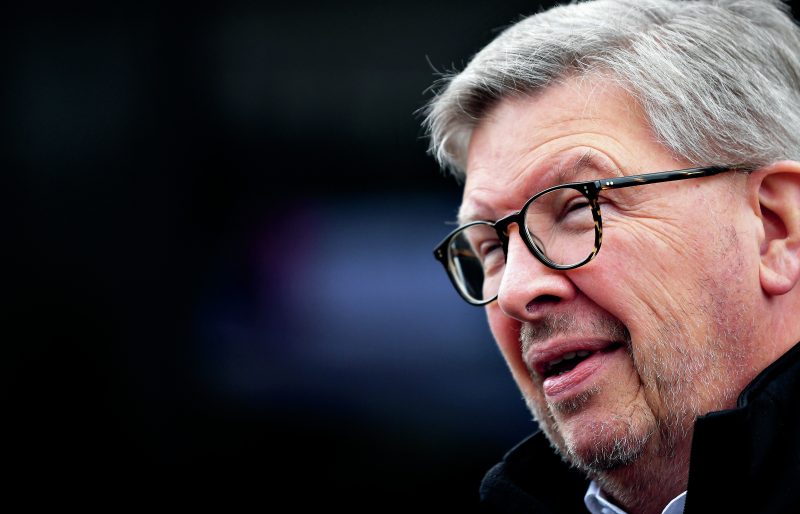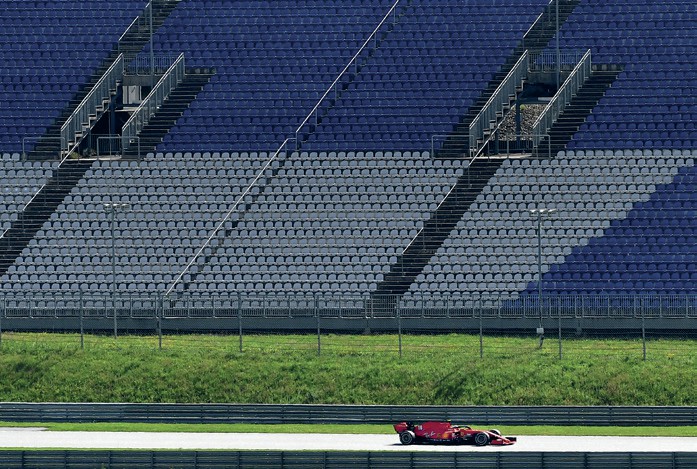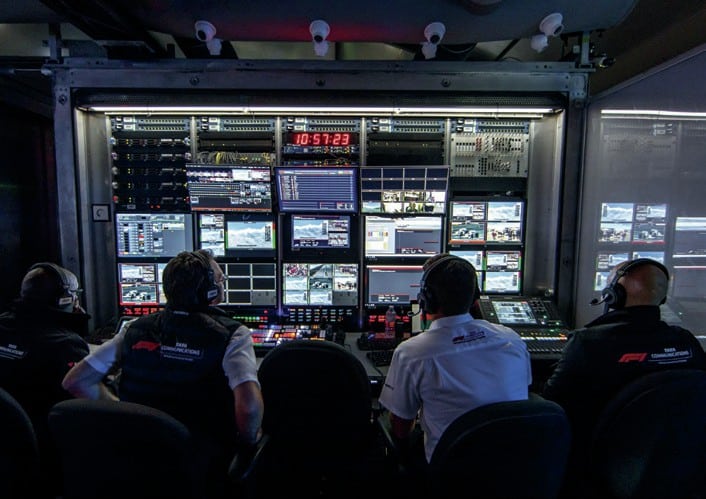Ross Brawn: 2021 will not be a normal F1 season
There’s much riding on 2021 and with Covid restrictions none of it is predictable, but as Ross Brawn explains to Chris Medland, there’s an emergency plan in place

“Everyone was thinking that this year would be easier, but it is not. The proof we have given in terms of professionalism, structure and protocols in place have been very important to manage this situation.”
When Stefano Domenicali accepted the role of Formula 1 CEO, like many of us he was expecting to face a challenging situation but one that was improving all the time. That much was made clear by the record 23-race calendar the sport approved at the end of 2020, kicking off in Australia as usual and ending once again in Abu Dhabi.
But no sooner had Domenicali got his feet under the desk in January than changes needed to be made. Australia was pushed back to November, China postponed and Imola added, while a TBC race has remained TBC as uncertainty over Portugal’s ability to host an event continues, although it now seems set to take place.
Fortunately for the Italian, he wasn’t being handed full responsibility; that hasn’t been Liberty Media’s approach to running F1. A three-man management team of Chase Carey, Ross Brawn and Sean Bratches was installed back in 2017, and Carey remains chairman. But it’s Brawn who Domenicali knows well from their time together at Ferrari, and the managing director of motorsport also has clear knowledge of what worked and what didn’t when F1 went back racing in 2020. It will prepare him for what’s to come.
“I would’t pretend this is going to be a normal season,” Brawn says. “I think there will be challenges. Nobody can predict how this virus is going to evolve and develop and we’ve got the comfort of vaccination but that is unlikely to be complete, certainly not at the beginning of the season.
“I think there are quite a lot of variables in there, but we’ve shown ourselves to be up to the task and the promoters have shown themselves to be pretty adept at stepping up quite quickly. It’s finding this correct balance between, primarily, safety and then making sure we can have good races, and that we have a good business model to maintain the finances of Formula 1.
“In the Formula 1 family, teams rely on the prize fund – some more than others. We have a business to run, so we need to find that compromise. Last year, economically speaking, wasn’t our strongest, which was a shame because 2019 was our best year, and then like most companies and most sports we had the challenge of 2020. But actually, I think we came out of it pretty well under the circumstances.
“So we’ve got to find a balance of all those elements, and it’s a live thing, it’s evolving every day and there are decisions being made every day to ensure we go in the right direction.”
Although confident that Bahrain will host the first race of the 2021 season at its impressive Sakhir facility, even at this stage Brawn can’t speak with any certainty beyond that. But his point about the F1 ‘family’ is important. The sport can’t afford to get it wrong, for both itself as a business and others who are dependent on it.
While the 2021 calendar looks familiar in terms of the races that have been selected and in the order they appear, particular attention was paid to the times when F1 was likely to run into trouble.
“Most of the promoters were keen on a date later in the year for obvious reasons, and we don’t want to make it too crowded but we’ve done our best to have a manageable programme more in the latter two-thirds of the year than the first third. It varies. Every country is in a different condition at the moment, but we’ve given ourselves a bit of breathing space at the beginning.
“Anyone who cancelled last year, they did it with a heavy heart. There’s tremendous enthusiasm for races within Formula 1. We have a lot of support from the promoters, from the countries, and they’re all very, very keen to have races. So that’s not been an issue; the issue has been countries and promoters respecting their local conditions, not worries about the Formula 1 community coming to the track or the country.

Empty seats at the Red Bull Ring. This will be a familiar sight for some months
In some ways it is encouraging for promoters to see how different Formula 1 is as a whole when it arrives at each venue to race in a Covid-19 environment. Multiple PCR (polymerase chain reaction) testing stations were used in 2020 and will be again this year, while the logistics of the broadcast operation on-site has also been made less complex.
That might seem like a small change, but it is the TV public that is so attractive to many promoters, while for F1 itself it ensures a more agile set-up when there can be last-minute changes to the racing schedule.
“Within our broadcast centre, we had a long-term plan to move a lot of those activities into what we call the remote broadcast centre, the base back at Biggin Hill,” Brawn explains. “A number of activities were going to be homebased rather than people travelling the world, and that needed some changes in the technology for us to be able to do it.
“We had a two-year plan to do that and we accelerated it into four or five months. In fact our broadcast centre now is probably half what it used to be and the rest of the people are operating remotely from Biggin Hill. That went well and we’re now on the second iteration of that. This year we’ll see a refinement of that.
“So we would never consider going back now to taking all those people round the world with us. We’ve trimmed down the operation and by doing it the correct way we’ve made ourselves more efficient and certainly not impacted the quality of the product.”
Fans watching from home don’t pick up on a difference to the output, and the beauty of F1 means the lack of a crowd at many races last year was barely noticeable. That’s because most of the atmosphere comes from the noise of the cars.
But it’s the spectators trackside that can generate significant income for a promoter and the sport. No more so than within the Paddock Club, where the rich and famous, and sponsors and VIPs, all mingle in the heart of the action.
Getting those guests – and their money – back is clearly attractive for F1, but Brawn says no significant steps in that direction have been made because of the logistical challenges in the current environment.
“That’s where it steps up substantially in terms of the number of people involved,” he admits. “While we can demand of the people in the paddock strict protocols – pre-testing, testing several times over the weekend, they’re in their bubbles and have to maintain their bubbles when they’re in their hotel and when they eat – it’s a different thing when you move into Paddock Club because you’ve then got a group of people coming together who won’t have those protocols. You have to be certain that you can offer them a safe environment.

“There’s a little bit of time between when we’re able to have a safe race and when we’re able to have a safe race and the Paddock Club. There’s a gap between those two thresholds and having the safe race is the priority. We’ll have a safe Paddock Club when we believe that our means of managing the virus is good enough to give everyone a safe experience.”
“We would never go back to taking all those people round the world”
Beyond that, getting fans on site will be the next challenge. A few races managed it last year – in small numbers – but there are no guarantees many will be able to do so in 2021. This is where F1 has built in a further buffer, with the early rounds featuring a number of races which successfully held behind-closeddoors events last season and would be willing to do the same if required once again.
For venues such as Zandvoort, an early season slot was moved to give the returning Dutch GP the best chance of hosting spectators. It also marks the start of a European tripleheader that can still be easily executed as the usual Spa–Monza pairing if the Netherlands event proves unviable at late notice.
“A circuit and a promoter need to promote,” Brawn says. “They need to market their event and sell tickets with some confidence they’re going to be able to hold the event. It happened in 2020; some races sold tickets and then couldn’t have the race. Then they had to either postpone the ticket until the following year or make other arrangements.
“So there is a point at which a promoter will, I’m sure, make a decision on their ability to sell enough tickets and have a viable event or not to have the event at all. That will vary quite frankly with different countries, different promoters and different business models.
“If you take Bahrain, for example, spectators are important but it’s not the major driving factor. You take a race like Holland and spectators are the driving factor. So they’re all different, models vary and it depends on circumstances how much of a factor that is.”
The idea that some promoters might need to change plans is not one that F1 is ignoring. To counteract that, Brawn says the focus has been on ensuring the sport remains streamlined and efficient – through aspects such as fewer team personnel on site – so it can react at short notice. With clear protocols at each event, the paddock has become that bit more plug-and-play in the current climate, allowing back-up venues to be identified if required.
“We’re pretty standalone. There are a few countries – for instance Russia and Bahrain – that have their local testing regime they want us to use, and that’s proved to be satisfactory in the past, or we support it with the contractor we have that looks after all these things for us. So I think that side of things is very flexible in terms of reacting.
“Street circuits have to start building a few months before the grand prix so they have to make a decision to go ahead before the race is due to be held, and then they start to incur real costs when they do that. There’s naturally some anxiety in trying to predict where you are in two or three months’ time, but that’s just a call you’ll have to make at the time.
“Rather like last year we have one or two races in the background who could step up if we needed to. We don’t intend to, but I think we’re in the fortunate position, particularly with some of the newer tracks we went to in 2020, to have some races on short notice if we had to, but that’s not our plan.”
To say 23 races sounds ambitious is an understatement, but then so many scoffed at Chase Carey’s claims that there would be between 15 to 18 rounds last year. As a result of that remarkable achievement, Formula 1 has the blueprint that ensures 2021 has every chance of at least getting close to being a more normal world championship.
